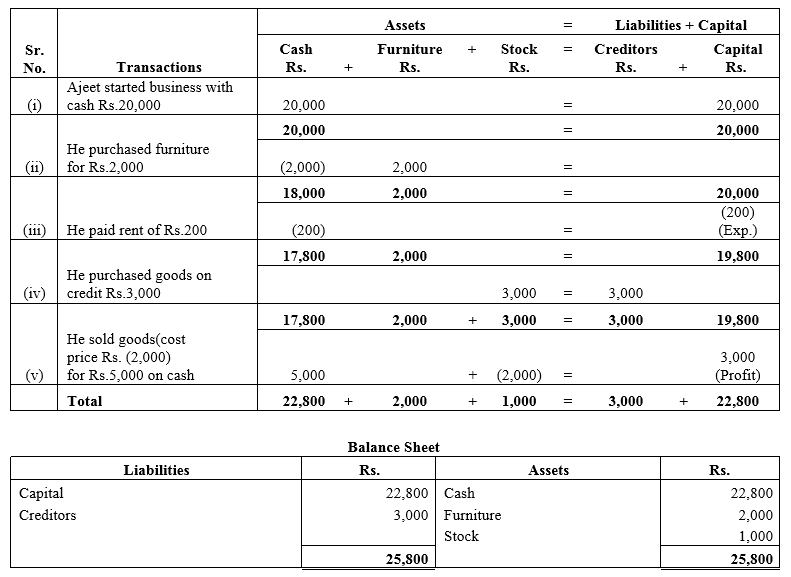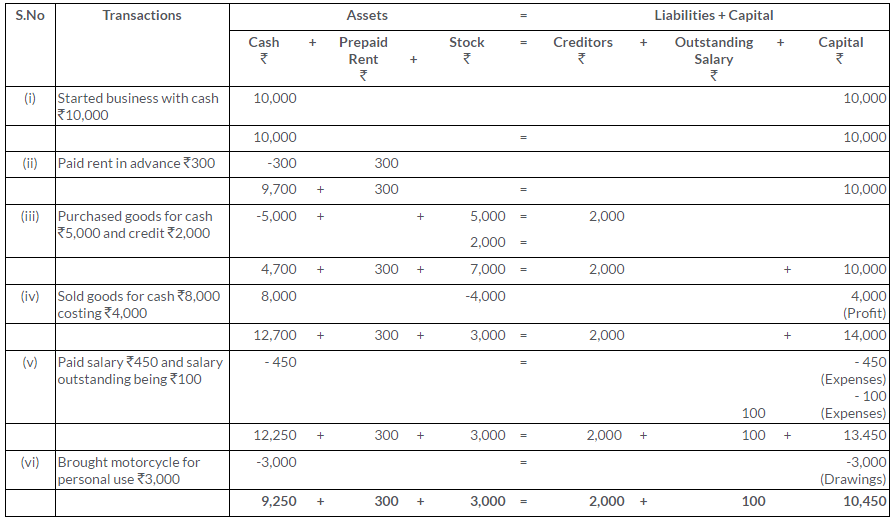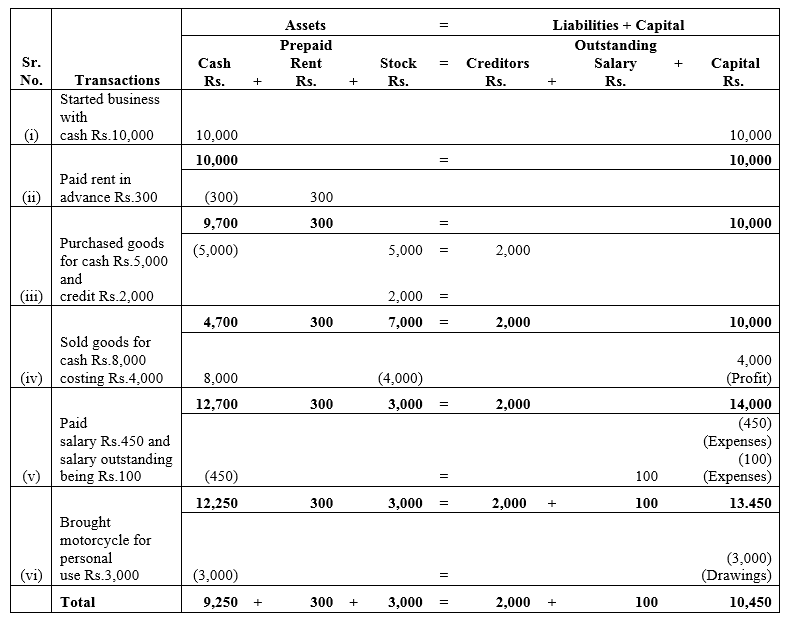
TS Grewal Accountancy Class 11 Solutions Chapter 2 Accounting Equation NCERT Books TS Grewal
Solution: Question 4. What will be the effect of the following on the Accounting Equation? (i) Harish started business with cash ₹ 18,000 (ii) Purchased goods for Cash ₹ 5,000 and on credit ₹ 2,000 (iii) Sold goods for cash ₹ 4,000 (costing ₹ 2,400) (iv) Rent paid ₹ 1,000 and Rent Outstanding ₹ 200 Solution: Question 5.

TS Grewal Solutions for Accounting Equation Class 11 Accountancy Chapter 5 Imperial Study
The solution for this question is as follows: Here, Liabilities = 10,000 Capital = 19,700 Assets = 10,000 + 19,700 = 29,700 Q.3 Show the effect of the following transactions on the Accounting Equation: (i) Started business with cash ₹ 50,000. (ii) Salaries paid ₹ 2,000. (iii) Wages Outstanding ₹ 200. (iv) Interest due but not paid ₹ 100.

DK Goel Solutions Class 11 Accountancy Chapter 6 Accounting Equations
Accounting equation for class 11, represents this dual principle of accounting, and it is generally written as under : - Assets = Liabilities + Capital (Accounting equation Problems and Accounting Equation Question are dealt with in Class 11).

Class 11 Accounting Equation L4 Formation of T Shape Account Questions Practice Padhle
Solution: Question 3 Show the outcome of the following transaction on the accounting equation. Began a company with cash ₹50,000 Salaries paid ₹ 5,000 Wages outstanding ₹1000 Interest due but not paid ₹500 Rent paid in advance ₹ 300 Solution: Question 4 What will be the accounting equation of the following.

Looking Good Accounting Equation Class 11 Dk Goel Download Balance Sheet From Mca
TS Grewal Accounting Equation Solution Class 11 in PDF. For the convenience of students our team has bundled the TS Grewal Accounting Equation Solution Class 11 in PDF which not only helps students to access the solutions of questions but help them to use them any time they want. PDF is a Portable Document Format file which allows one to access.

11 Class Accounting Equation Illustration 3,4,5 YouTube
The solution for this question is as follows: Liabilities = Assets- Capital Liabilities = ₹5,000 + ₹20,000 + ₹60,000 + ₹25,000 - ₹75,000 = ₹1,10,000 - ₹75,000 = ₹35,000 Q.4 What entry (debit or credit) would you make to (a) increase in revenue (b)decrease in expense (c) record drawing (d) record the fresh capital introduced by owner.

TS Grewal Solution for Class 11 Accountancy Chapter 2 Accounting Equation
Class 11-commerce CBSE Class 11-commerce Textbook Solutions T S Grewal Solutions Accountancy Chapter 5 Accounting Equation Class 11-commerce T S GREWAL Solutions Accountancy Chapter 5 - Accounting Equation 5.18 5.19 5.20 5.21 5.22 Accounting Equation Exercise 5.18 Solution 1 Solution 2 Solution 3 Solution 4 Accounting Equation Exercise 5.19

TS Grewal Solutions for Class 11 Accountancy Chapter 2 Accounting Equation
Students in Class 11 who study accountancy and use the DK Goel Accountancy book to understand concepts of Chapter 6 Accounting Equations should understand the concepts and solve practice questions and exercises given at the end of the chapter. We have provided solutions for all questions and have also provided short notes for each problem.

TS Grewal Accountancy Class 11 Solutions Chapter 2 Accounting Equation NCERT Books
TS Grewal Accountancy Class 11 solutions is a significant part of the Accountancy syllabus for board exams. This chapter talks about Accountancy Equations. The accounting equation is a reflection of important constituents of a company's financial indices associated very closely with each other. These are Assets, liabilities, and owners' equity.

Class 11th Accounting Equation Part 7, Question 5 BBDA YouTube
These solutions for Accounting Equation are extremely popular among class 11 Commerce students for Accountancy Accounting Equation Solutions come handy for quickly completing your homework and preparing for exams.

plz solve this accounting equations class 11 question Brainly.in
Are you looking for the solutions of TS Grewal class 11 Accountancy CBSE Board for the 2022-23 Session? I have solved all unsolved questions of all chapters of it Solutions of TS Grewal Class 11 CBSE Board (2022-23) Here is the list below Share your love Anurag Pathak Anurag Pathak is an academic teacher.

Sc Sharma Accountancy Class 11 Solutions Accounting Equation 45+ Pages Explanation in Doc [1
NCERT Solutions For Class 11 Accountancy encompasses all the questions provided in NCERT Books for 11th Class Accountancy subject. At BYJU'S, students can download for free.

TS Grewal Solutions for Accounting Equation Class 11 Accountancy Chapter 5 Imperial Study
Class 11 || Accounting Equation || Question & Solution || Accountancy || AG TV||Accounting Equation model question https://youtu.be/enTXOz090tU

Class 11 Accounts Chapter 5 Accounting Equation Full Chapter Practical Problems (Part 1) YouTube
Full syllabus notes, lecture and questions for Accounting Equation - DK Goel Solutions - Class 11 Accountancy - Commerce - Commerce. The "Accounting Equation Commerce Questions" guide is a valuable resource for all aspiring students preparing for the Commerce exam. It focuses on providing a wide range of practice questions to help students.

TS Grewal Class 11 Accountancy Solutions Chapter 2 Accounting Equation 2023 Download Free PDF
Solution 1: Below are the purposes of the accounting equation:- (i) Accounting equations despites the accuracy of a financial transaction. (ii) From accounting equations we can easily prepare final accounts. Question 2: Which of the following equations are correct? I. Assets = Capital + Liabilities II. Assets = Capital - Liabilities III.

Class 11 Accounting Equation solution YouTube
Answer 1. An Accounting Equation is a mathematical expression which shows that the assets and liabilities of a firm are equal. An Accounting Equation is based on the dual aspect concept of accounting meaning; every transaction has two aspects- debit and credit. It holds that for every debit there is a credit of equal amount and vice versa.